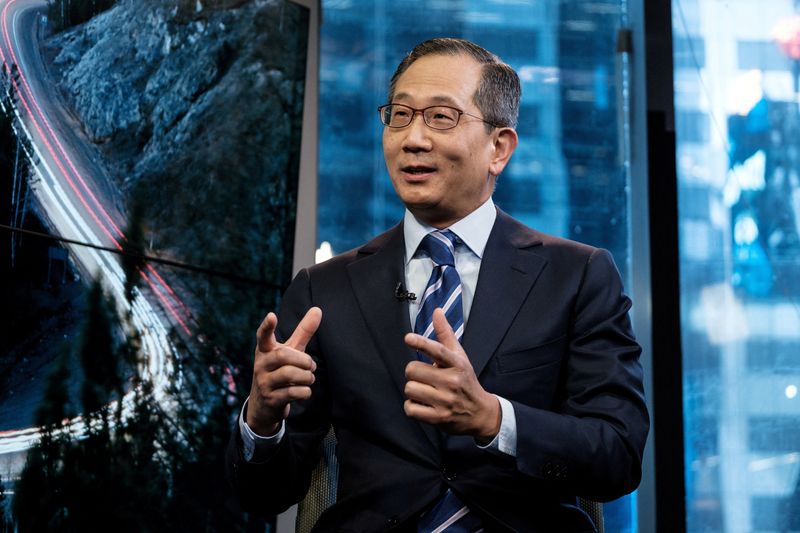By Chibuike Oguh and Angelique Chen
NEW YORK (Reuters) - Kewsong Lee bolstered Carlyle Group (NASDAQ:CG) Inc's growth after he took over the reins in 2018, yet the private equity firm continued to play catchup with its larger and more diversified publicly listed rivals, according to people close to the situation, analysts and investors.
Carlyle announced this week that Lee would step down as chief executive without a replacement lined up. Sources familiar with the matter attributed the move to a refusal by the firm's founders, who collectively control 26% of Carlyle, to negotiate a more favorable employment contract with Lee.
The founders -- David Rubenstein, William Conway and Daniel D'Aniello -- believed some of the organizational decisions Lee made upset some partners at the firm, according to the sources, who spoke on condition of anonymity. These decisions included doing away with the co-head structure in some divisions and making compensation tied closer to the fortunes of the entire firm rather than individual funds, the sources said.
The founders also believed Lee did not take enough of their views into account in the running of the firm, and their relationship cooled over time, the sources added.
A Reuters review of Carlyle's financial disclosures, as well as interviews with investors, analysts and current and former employees, shows that the firm made strides under Lee in catching up with its publicly listed peers in terms of profitability, asset diversification and valuation -- yet a substantial gap remained.
These findings highlight the challenges that Carlyle's founders face as they seek Lee's successor. The firm said on Sunday it would work with a headhunting firm to find a new CEO and did not set a timetable for the process.
Spokespersons for Carlyle, Lee, and the firm's founders declined to comment.
Carlyle's shares rose 66% from the time Lee started leading the firm at the beginning of 2018 until he stepped down on Sunday. He co-led the Washington-based firm alongside Glenn Youngkin until September 2020, when the latter stepped down and went on to run successfully for governor of Virginia, leaving Lee as sole CEO.
By comparison, shares of Carlyle peers Blackstone (NYSE:BX) Inc, KKR & Co (NYSE:KKR) Inc and Apollo Group Inc have risen 213%, 146% and 73%, respectively, since the start of 2018.
To be sure, Carlyle's stock performance under Lee was better than under the stewardship of its founders. Carlyle shares dropped 12% in the five years before Lee took over, compared with a 110%, 38%, and 121% rise in the shares of Blackstone, KKR and Apollo, respectively.
That underperformance was driven by Carlyle's slow growth in assets under management and investor concerns about its strong reliance on performance fees generated by its private equity business. Those fees are lucrative but irregular, booked only when Carlyle sells companies it invested in or distributes dividends from them.
Lee sought to address this by expanding Carlyle's credit investment business, which generates management fees that are lower than performance fees but more reliable. He did this by acquiring smaller credit managers and signing deals with insurance companies to manage their assets.
One of those deals, with reinsurer Fortitude Re, boosted Carlyle's fee-paying assets this year by $50 billion.
As a result, Carlyle's credit assets under management soared to $143 billion as of June, Lee's last quarter as CEO, from $33 billion at the start of January 2018 when he started on the job. Credit assets accounted for 38% of Carlyle's total assets as of the end of June versus 17% at the start of January 2018.
Yet most of Carlyle's assets are still in businesses that generate performance fees such as private equity and real estate, which also grew during the period.
"In this environment, investors want a high degree of earnings predictability, and Carlyle still makes a large percentage of its earnings from performance fees, which are volatile and likely to be under pressure near-term," said BMO Capital analyst Rufus Hone.
IN NEED OF RETAIL MONEY
Another reason for the lag in Carlyle's share performance relative to its peers, analysts and investors say, is that the firm is not raising as much capital from high net-worth individuals and other retail investors as its peers. This weighs on its stock because investors see this area as offering rapid growth compared to other more mature private equity businesses.
Carlyle's perpetual capital, which includes money committed by retail investors, accounts for just 15% of its asset base, versus 58% for Apollo, 38% for Blackstone and 36% for KKR, according to regulatory filings.
The firm said last year it was focused on attracting capital from institutional investors, including public pension funds, insurance firms and sovereign wealth funds.
"The lag has been because Carlyle's growth strategy was too private equity- and institutional investor-focused over the past 10 years relative to peers," Piper Sandler analyst Sumeet Mody said.
